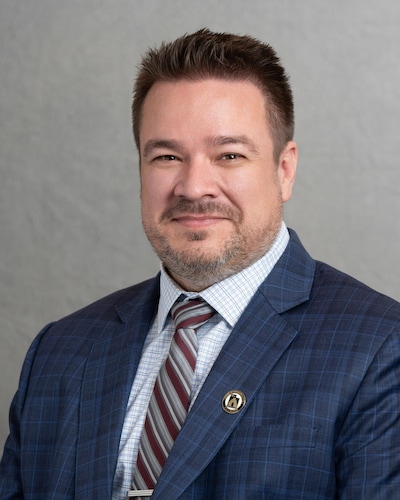In the wake of sometimes-boisterous protests near churches and synagogues, the Utah House has overwhelmingly passed a bill that would make it easier for law enforcement to intervene on behalf of faith groups.
Introduced by Rep. Matt MacPherson, R-West Valley City, HB271 would update existing Utah law to disallow people from preventing or “substantially” disrupting a lawful gathering — be it by use of force, violence or the threat of violence. The measure would also disallow individuals from blocking anyone from entering or leaving a building where a gathering is taking place, or hindering that meeting through “the use of excessive sound.”

(Matt MacPherson) Rep. Matt MacPherson created the bill after being approached by members of various churches and synagogues seeking stronger protections against disruptive protesters.
MacPherson said the bill, which now awaits Senate action, represents a response to concerns raised by members of various churches and synagogues regarding demonstrators — in particular those protesting Israel’s attacks on Gaza — interrupting funerals, weddings and regular worship services primarily through noise.
Included in the list of incidents these individuals described were harassers taking pictures of them and their children and posting them on social media, making verbal threats and aiming bullhorns at the windows of their places of worship.
When worshippers sought help from police, MacPherson said, “vague” language in Utah code limited officers’ ability to respond. Especially problematic, he added, was the need for police to prove the protesters were “intentionally” disrupting a lawful gathering.
To solve this, HB271 would include the term “knowingly,” thus allowing police to act when protesters were informed they were hindering a gathering but persisted in their activities.
“The goal,” MacPherson said, “is to give law enforcement a clear path for when and how to intervene,” all while balancing the First Amendment rights of free speech and free worship.
Rabbi Samuel Spector of Salt Lake City’s Congregation Kol Ami is among those who have been frustrated by the limits put on law enforcement to protect worshippers from harassment.
The faith leader described a recent incident in which an individual drove onto the synagogue’s property and began shouting obscenities at those walking across the parking lot. Congregants brought the license plate number and a description of the harasser to the police, only to learn that there was not enough to charge the person.
“That kind of behavior intimidates people,” Spector said, “who then don’t come back because they’re scared.”
(Chris Samuels | The Salt Lake Tribune) Congregation Kol Ami Rabbi Samuel Spector in Salt Lake City, Wednesday, Sept. 25, 2024. The faith leader said his congregation has been the target of harassment, leading some of its members to stay away.
When asked if the new bill could impact the twice-yearly General Conferences held in downtown Salt Lake City by Utah’s predominant faith, The Church of Jesus Christ of Latter-day Saints, MacPherson said it was unlikely — “unless protesters have some massive sound-generating machine that could pierce granite.”
He explained that under the proposed law, “you can’t just say ‘I felt icky because they had signs that said Mormons are weirdos’” and expect the protester to be arrested.
In contrast, he noted, if an individual stalked a worshipper leaving or entering the building, making threats of violence, this bill could result in the aggressor being charged with a class B misdemeanor.







